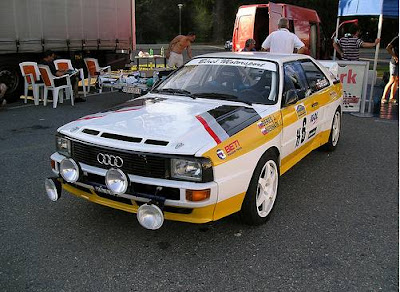
Tuning an Audi 80 depends very much on year and engine type, and some parts for older variants may be very difficult to come by, resulting in quite a few owners of 1960s Audis having to source parts from wreckers yards or pay a premium for new parts manufactured by Audi
Audi 80 Tuning modifications.
 Engine capacity and power output varied considerably over the thirty year production of the Audi 80, beginning with normally aspirated 1.6 liter engines right through to the final years of production when 2.0 liter petrol and 1.6 liter turbo diesel engines were fitted as standard.
Engine capacity and power output varied considerably over the thirty year production of the Audi 80, beginning with normally aspirated 1.6 liter engines right through to the final years of production when 2.0 liter petrol and 1.6 liter turbo diesel engines were fitted as standard.The same body shape with larger 2.3 liter five cylinder engine and more luxurious interior trim was also marketed as the Audi 90. The two models are essentially the same, and a lot of cross compatibility of parts exists. In fact it is possible to drop a 2.3 liter from an Audi 90 into an Audi 80 with minor adjustment and proper tuning.
Tuning the Audi 80 for maximum performance should probably start with getting the engine and drivetrain back to as near new condition as possible, a full service and diagnostic analysis should be undertaken to ensure the baseline measurements conform to standard.
Owners of the turbo diesel and MPFI engines will get more performance thru acceleration and top end by re-chipping the car with an aftermarket chip, then tuning again with the new baseline. Most kits provide full installation instructions from removal of the old chip to soldering in the new chip an the entire process can take less than a couple of hours with the right setup.
Some models of Audi 80 do not feature a removable chip, and the entire computer will either need to be removed and sent to the chip programmer, or the car taken to a custom tuning workshop with the capability to reprogram the ECU.
Audi 80s are known for needing regular coolant changes, usually every two years, and before starting your cars performance tuning it’s a good idea to change the coolant and check for head gasket leaks.
Catalytic converters on the Audi 80 and variants can also be problematic, unfortunately it’s a design fault, and replacing this with one from a wreckers yard may not entirely solve the problem.
A fast road cam will be one of the best power mod you can do mechanically to your engine. Don't forget to uprate the fuelling when you are increasing the power - it makes the car more thirsty.
Match the timing carefully to your mods, a little advance is usually all that is needed to maximise the power delivery.
Original cars were carb fuel fed. Uprating this to some twin 40's or even going to an electronic fuel injection system will dramatically increase the power of your Audi 80.
Audi 80 Intake and Exhaust Tuning.
The next area for modification is the intake and exhaust. For smaller Audi 80 engine sizes go with a washable high performance air filter.
Do not go with the biggest exhaust you can find this will slow up the exhaust flow rate - the best for power gains are usually between 1.5 to 2.5 inches.
Head work including a polish and port and 3 or 5 angle valve job will really help to release the potential of the engine.
As these engines are quite old now they will really benefit from a strip down and rebuild anyway. Fit larger valves whilst the head is off and if you want to stay NASP increase the compression ratio to take advantage of modern high octane fuel.
Audi 80 Wheel modifications.
Alloy wheels will help the brakes cool down and are usually lighter than the steel ones. Large alloy wheels will decrease performance so don't go to big, the original wheels had very high profile tyres on them so match a larger rim with lower profile tyres and you can keep the overall wheel size the same. It will also look much better with bigger rims.
For more information on Tuning your car please join us in our friendly forum where you can discuss Audi 80 options in more detail with our Audi 80 owners. It would also be worth reading our unbiased Audi tuning articles to get a full grasp of the benefits and drawbacks of each modification.
No comments:
Post a Comment